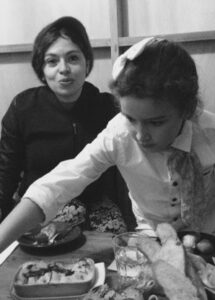“Who’s your rock?” by Nadja Fernandes
 Just yesterday morning a private student was telling me about someone very close to him – his partner – who struggled with depression around a year ago, and how it was so difficult to overcome. We spoke about the prejudice around depression, and I decided to share with him that I had been there too and understood what he was talking about. We agreed it is often the case that people are not given permission not to be ok. Coincidentally, that same morning, there was a talk on the radio about it. So with my student, listening to him relating his story, I felt deeply sorry about the fact that his partner basically had nobody around them, to support them during that rough time. As they were new to the country, they felt the expectations to show that they were strong and capable were higher.
Just yesterday morning a private student was telling me about someone very close to him – his partner – who struggled with depression around a year ago, and how it was so difficult to overcome. We spoke about the prejudice around depression, and I decided to share with him that I had been there too and understood what he was talking about. We agreed it is often the case that people are not given permission not to be ok. Coincidentally, that same morning, there was a talk on the radio about it. So with my student, listening to him relating his story, I felt deeply sorry about the fact that his partner basically had nobody around them, to support them during that rough time. As they were new to the country, they felt the expectations to show that they were strong and capable were higher.
His partner had to take some medication and he was her rock. That made me think about this project I got involved in, the ‘My-dis-abilities’ book project. Why? Because it made me think about many other stories, that I am yet to read once the book is finished and published, where I am bound to find many inspiring accounts of strong people who either live with a debilitating condition, or help care for someone with one. I had never paid enough attention to the side of the carer, although of course, I knew it must be challenging. It was only after the conversation with that student, probably because he was explaining to me what HE went through, and how he was impacted, that I fully realised how amazing all those carers are – I am using the word carer to refer in a generalised way to anyone who co-habits with or looks after a person that has any kind of disability and/or mental disorder.
A few hours after that I had a car accident. No one got physically injured but I am still quite shaken. I even dreamed that I was driving and while stopped at the lights, a stern-looking man opened the passenger door and told my daughter to put her seatbelt on. I just want to point out that we always have our seatbelts on, and she generally uses the backseat, rather than the passenger seat. Anyway, it was just a dream. After one night of sleep, I woke up feeling very flat, and suddenly the conversation of the day before came to my mind. I felt sad but was also reminded that I was in one piece and more importantly, so was my daughter. I felt appreciative and humbled by the thought of all those people facing harder challenges, stories, traumas. They are there, firm, strong, loving, reliable. A real rock. I had my rock too when I was depressed. In fact, I had a couple. I’m forever grateful to them, and I don’t think I could have managed without them. It was hard for me, and now I realise better that it must have been hard for them too. Let’s say that it’s hard being a rock.
My student’s partner got out of the depressive episode after a few months and they are both much better nowadays. I guess for me this mixture of stories is telling me that we need more awareness because that will give us more appreciation and empathy. That is why I am writing this text, and why I am part of the My-Dis-Abilities project.